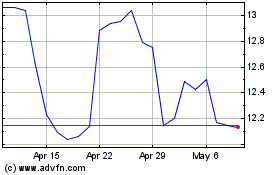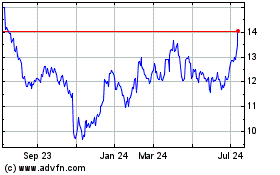By Mike Colias, John D. Stoll and Chester Dawson
DETROIT -- Fiat Chrysler Automobiles NV said Sunday it will
invest $1 billion in two existing plants, creating what it says
will be 2,000 new jobs.
The decision ahead of Motown's annual car show comes as auto
makers have faced heat from the incoming administration of
President-elect Donald Trump to manufacture more vehicles in the
U.S.
Some of the sector's most powerful scions, including Ford Motor
Co. Chairman Bill Ford and Toyota Motor Co. President Akio Toyoda,
have in the week leading up to the auto show signaled they support
seeing more Made in the U.S.A. labels in America's driveways.
"We continue to reinforce the U.S. as a global manufacturing
hub," Fiat Chrysler Chief Executive Sergio Marchionne said.
Chrysler's Jeep dealerships recently started selling a small SUV
made in Italy and the company is moving certain other products to
Mexico. Fiat Chrysler, which is forgoing new product announcements
at the show, said it is expanding its pickup and SUV lineup at its
existing Ohio and Michigan plants.
U.S. buyers for decades placed brands into two categories --
American or foreign. Those distinctions became irrelevant in the
past decade as powerhouses like Toyota added production in the U.S.
and Detroit's big three cut American workforces and sank billions
of dollars into factories overseas.
About half the parts on a typical "American" car come from
foreign sources, a sign that buyers now rank safety, quality or
design higher than the origin of its content.
Until last week, Mr. Trump's autos criticism centered on a $1.6
billion factory Ford was building for small cars in central Mexico.
Mr. Ford called Mr. Trump on Tuesday to tell him the plant was
canceled, future small-car production would be done in an existing
Mexico factory and $700 million will be invested to create 700 jobs
in Michigan, the company said.
Hours later, Mr. Trump received another phone call from Mary
Barra. General Motors Co.'s chief executive, one of 20 business
advisers to Mr. Trump on economic issues and jobs growth, had seen
her company called out in an early-morning tweet.
The president-elect said GM's Chevrolet imports from Mexico
should be charged a "big border tax." Ms. Barra called Mr. Trump
and engaged in a "very positive and cordial" lengthy conversation,
according to two people familiar with the call.
The 55-year-old CEO is no stranger to political conflict, having
steered GM through a safety-recall crisis shortly after taking the
helm in 2014, and the discussion "went very well," one of the
people said.
Toyota's $1 billion plan to import small cars to U.S.
dealerships later in the decade was also chastised last week by way
of Mr. Trump's Twitter account hours after Mr. Toyoda told
reporters in Tokyo the company is aligned with the incoming
administration. The Japanese executive will appear at Monday at the
auto show to reveal important products.
Detroit's auto show has been in the political spotlight before.
In 2009, with domestic car companies running out of money and in
need of additional funds, GM executives used the event to lobby for
government help. Playing off a commitment the company made to
launch plug-in hybrids, employees walked the floor of the city's
Cobo Hall carrying signs saying "Here To Stay" and "Charged Up" in
an attempt to get the attention of lawmakers just days before
Barack Obama's inauguration.
One of Mr. Trump's biggest concerns -- Mexican car production --
thrived during the Obama administration. The Ann Arbor, Mich.-based
Center for Automotive Research estimates Mexican light-vehicle
assembly capacity is projected to double in size between 2010 and
2020.
In 2011, following its bailout of two Detroit car companies, the
White House declared a "quiet resurgence" was under way in American
manufacturing, led by an auto industry poised to invest.
In the six years that have followed, 11 new assembly plants have
been built or announced in North America, with nine of them going
south of the U.S. border, according to CAR, including the one Ford
shelved.
Ms. Barra, as an adviser to Mr. Trump, could emerge as the
best-placed defender of a broad move to find lower-cost
manufacturing resources. Companies like GM are investing heavily to
stave off Silicon Valley tech companies in the race to build
autonomous vehicles that are safer than those driven by humans, and
to meet stringent fuel-economy standards set by the Obama
administration.
GM is pushing low-cost sourcing more vigorously than any of its
rivals. The Detroit auto giant imported an estimated 33,000 Buick
sport-utility vehicles from China this year, becoming the first
major auto maker to tap a factory there to fill U.S. showrooms.
Unlike Ford, which relies on Mexico for low-margin passenger
cars like the Fiesta compact or Fusion sedan, GM's plants in Ramos
Arizpe, San Luis Potosi and Silao are profit machines. More than
40% of the company's full-size pickups come from Mexico, along with
100,000 of the popular Chevrolet Trax small crossover wagons,
according to researcher WardsAuto.com.
Chevrolet Silverado and GMC Sierra pickups underpin GM's overall
operating profit, estimated to have topped $10 billion in 2016. The
Detroit auto maker is in the midst of a $5 billion investment spree
in Mexican facilities and is gearing up to boost its output of
compact SUVs in the country.
GM also relies on exports from South Korea.
--Michael Bender contributed to this article.
Write to Mike Colias at Mike.Colias@wsj.com, John D. Stoll at
john.stoll@wsj.com and Chester Dawson at chester.dawson@wsj.com
(END) Dow Jones Newswires
January 09, 2017 02:47 ET (07:47 GMT)
Copyright (c) 2017 Dow Jones & Company, Inc.
Ford Motor (NYSE:F)
Historical Stock Chart
From Mar 2024 to Apr 2024

Ford Motor (NYSE:F)
Historical Stock Chart
From Apr 2023 to Apr 2024
